Search Generative Experience: Google Brings AI to its Search Results
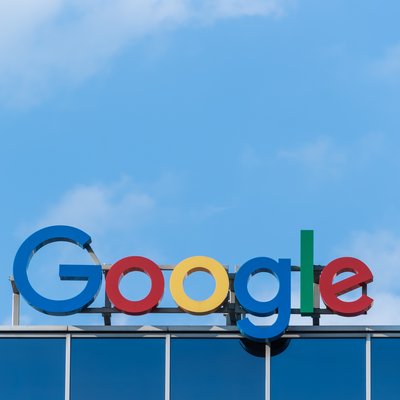
It’s been a couple of weeks since Google announced the new Search Generative Experience (SGE) at it…

Google's Search Generative AI is a huge change for the search engine as we know it, and for brands, the impact will likely be the most significant. We're going to run through the ways brands might have to adapt to the new era of AI search.
Google’s Helpful Content Update gave us a sneak preview of what was to come. The focus of the update was on reducing the visibility of thin, basic and repetitive content - the type that adds to the noise rather than adding something different, new or unique - and created just to chase traffic.
In its place, Google aimed to offer greater variety in the search results. It aimed to reward those who stood out from the crowd or that offered something unique, be it data, expert opinion or a unique perspective.
The reality is it's no longer a case of trying to produce content that is better than your competitors or what currently exists on the topic. Instead of every brand in a vertical offering up a similar piece of content to fight for top spot, there are going to be prominent sections of the search results dedicated to delivering AI generated answers and prioritising the thoughts of experts.
This doesn't mean supporting content is now worthless. There is still value in producing content that satisfies Google’s E-E-A-T criteria. It’s this type of content that Google will validate the AI-generated answers against and that will potentially see you cited as a source in these answers.
But it is likely these pages will be less prominently featured in the search results. Plus, if it's just a reworded version of what's already out there then don’t hold out much hope for it driving organic traffic to your site. Now more than ever brands need to find a way to elevate and amplify their content beyond everything else available on the subject.
Links and authority have potentially become even more valuable. If Google is serving an AI answer and including sources that validate the answer it is producing, then those sources with the strongest authority signals are likely to be the ones cited.
It's exactly how the link principle works going all the way back to the creation of Google. Links are like citations in academia. If Google is going to "cite" your website as a source for the answer AI has generated (we’ve put that in inverted commas as it’s not really a citation, rather the site appearing alongside the AI answer), it's going to need a high degree of trust in that source.
Links and (potentially) brand mentions are the likely way it will gauge that level of trust. It’s nothing new and it’s always been a key part of SEO but it may have become even more important.
As previously mentioned, we anticipate most brands are going to see less organic traffic to their websites. Category leaders may potentially benefit from being the sources Google includes alongside AI-generated answers, but it’s hard to envisage anything other than less searches resulting in a click through to a website.
However, when users do get to your site, they are likely going to be better informed, further down the funnel and more likely ready to convert. Brand sites may play a lesser role in the early awareness and consideration phase, with users preferring more independent sources of information. But come the latter stages they arrive at your site primed and ready to convert.
All brands are going to have to find ways to influence those early stages but it could be the case that the focus for organic shifts more towards the conversion, loyalty and advocacy stages.
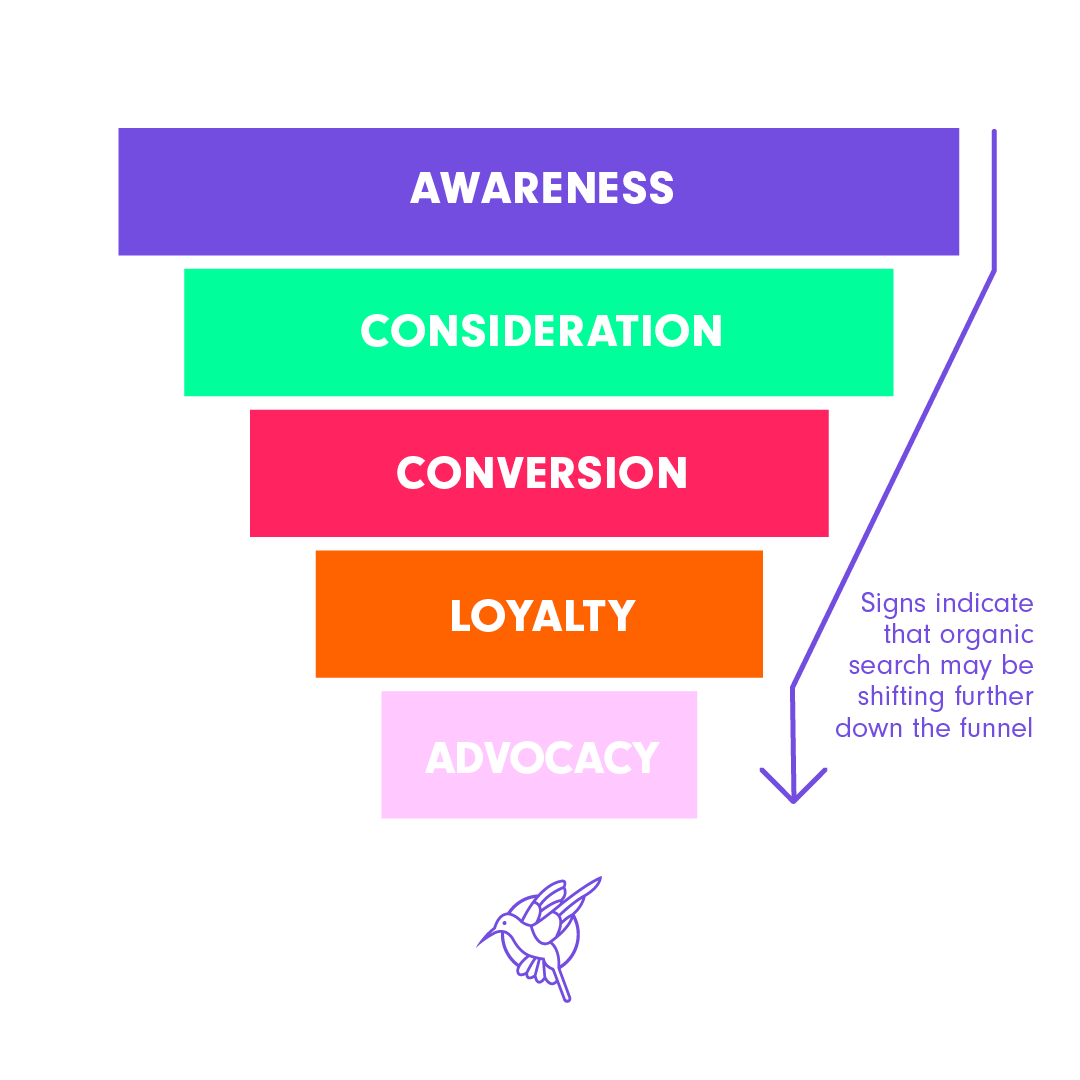
To borrow an accounting phrase, “traffic is vanity and conversions are sanity” for most ecommerce and lead generation sites. Conversions pay the bills and more traffic does not always mean more conversions. We may well see a refocusing on that as the primary measure of SEO success and less emphasis on rankings and visibility.
The other thing to note is that it's going to get harder to track organic rankings and visibility. No doubt tools like Moz, SEMrush and Ahrefs will be scrambling to work out how they can measure the presence of a URL in these new search results features. How accurate this is and how much value it will provide remains to be seen, but it’s certainly another change to adapt to.
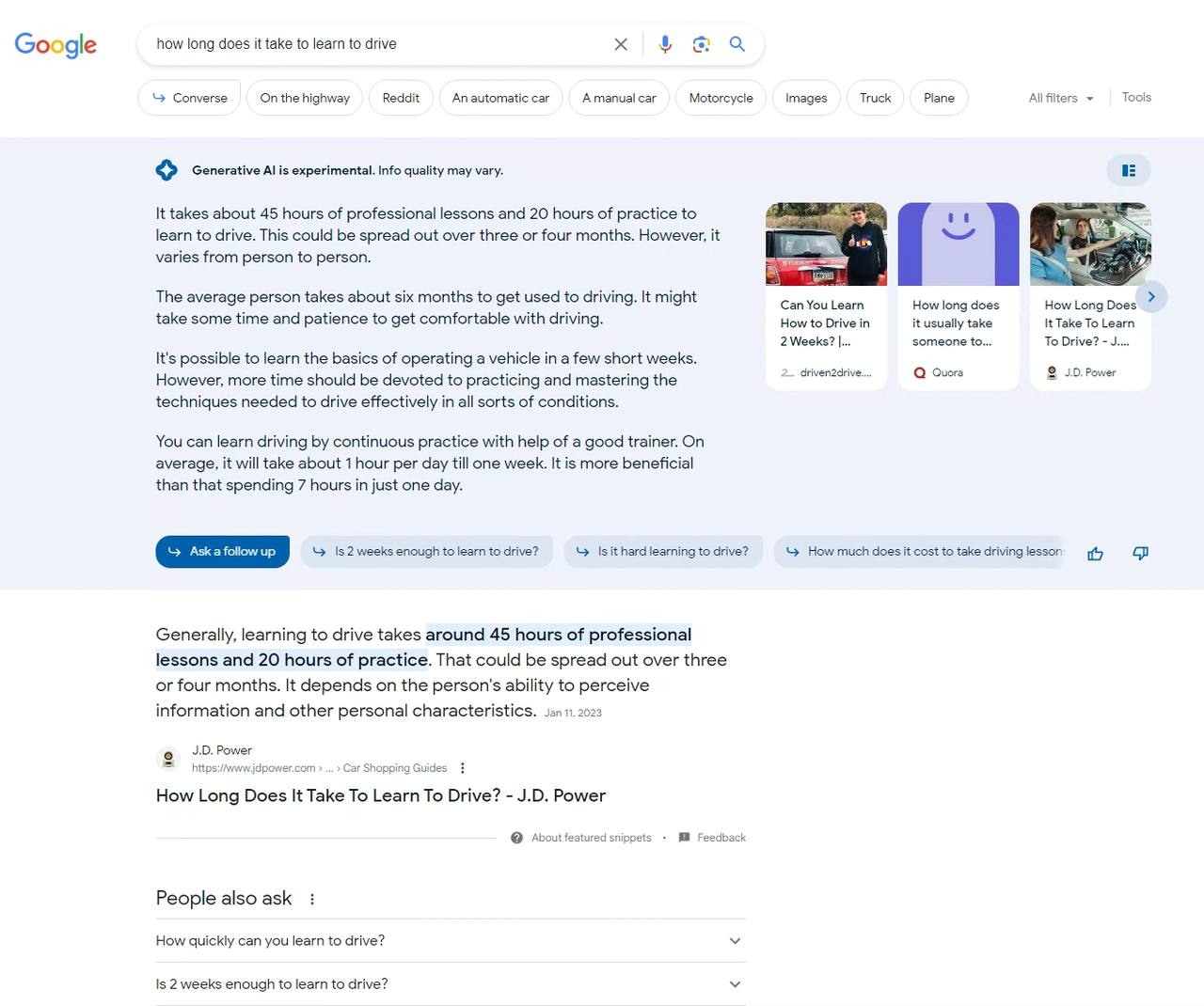
Take the above example. In the Generative AI answer there are three sites immediately visible but this is a carousel so more than three can be shown. Above these results is an expansion button which then shows these sites in a more traditional vertical style, still within the Generative AI panel but interestingly they are displayed in a different order.
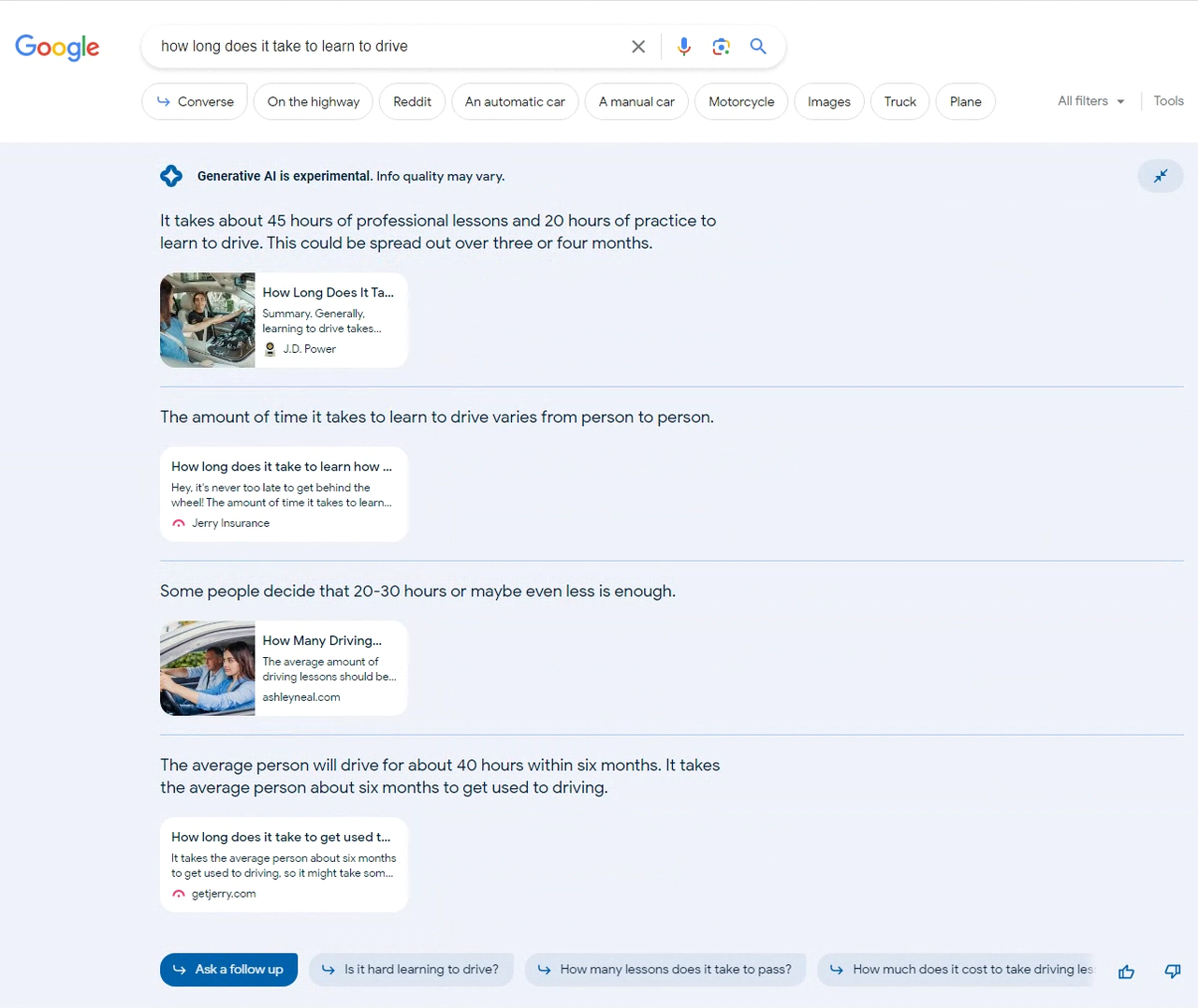
These are Google's cash cows and so it’s no surprise to see these integrated into the new features along with retaining their position at the top of search results pages. Even AI-generated search answers aren’t enough to topple them from the top of the page.
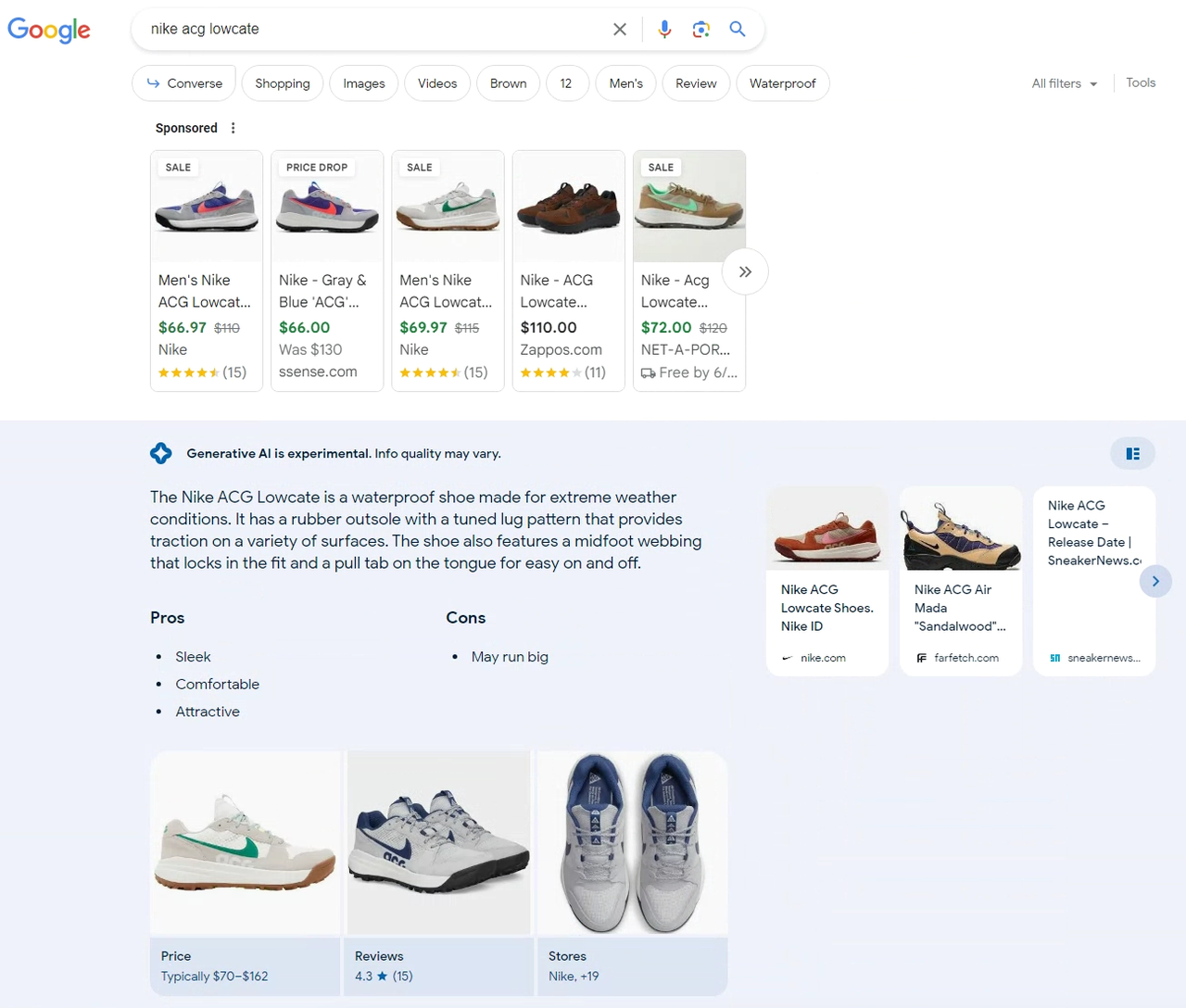
The Generative AI content produced for this commercial type query is typically quite generic but interestingly features reviews and stores as part of the answer. But there is clearly a desire to bring product results into the Generative AI results for broader commercially oriented queries where the user is searching for a product type rather than a specific product. It has also been reported that Ads are also being integrated into the AI results for commercially oriented queries. As always, these are accompanied by the ‘Sponsored’ label to distinguish them from organic results, but they appear to be given preferential treatment, sitting atop the list of products.
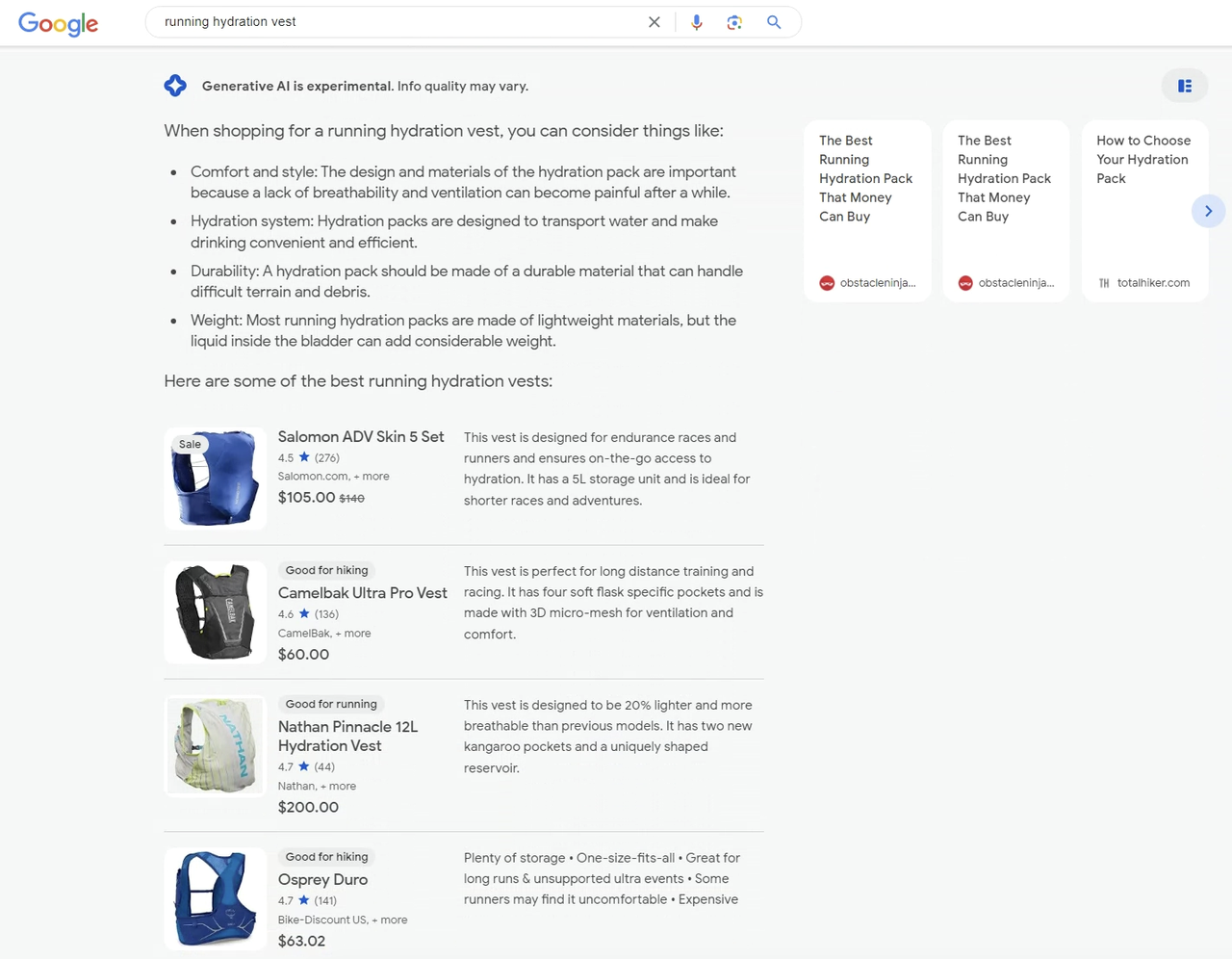
Placing ads above the Generative AI panel does look a little clunky and forced. The ads within this panel are more intuitive and natural for the search experience so don’t be surprised if we see greater integration here.
For non-commercial queries, search ads are also shown above the Generative AI panel with the same appearance as normal. Again, we could well see greater integration of these within the AI-generated results over time if the data shows that this is where they’re most likely to capture the user’s click.
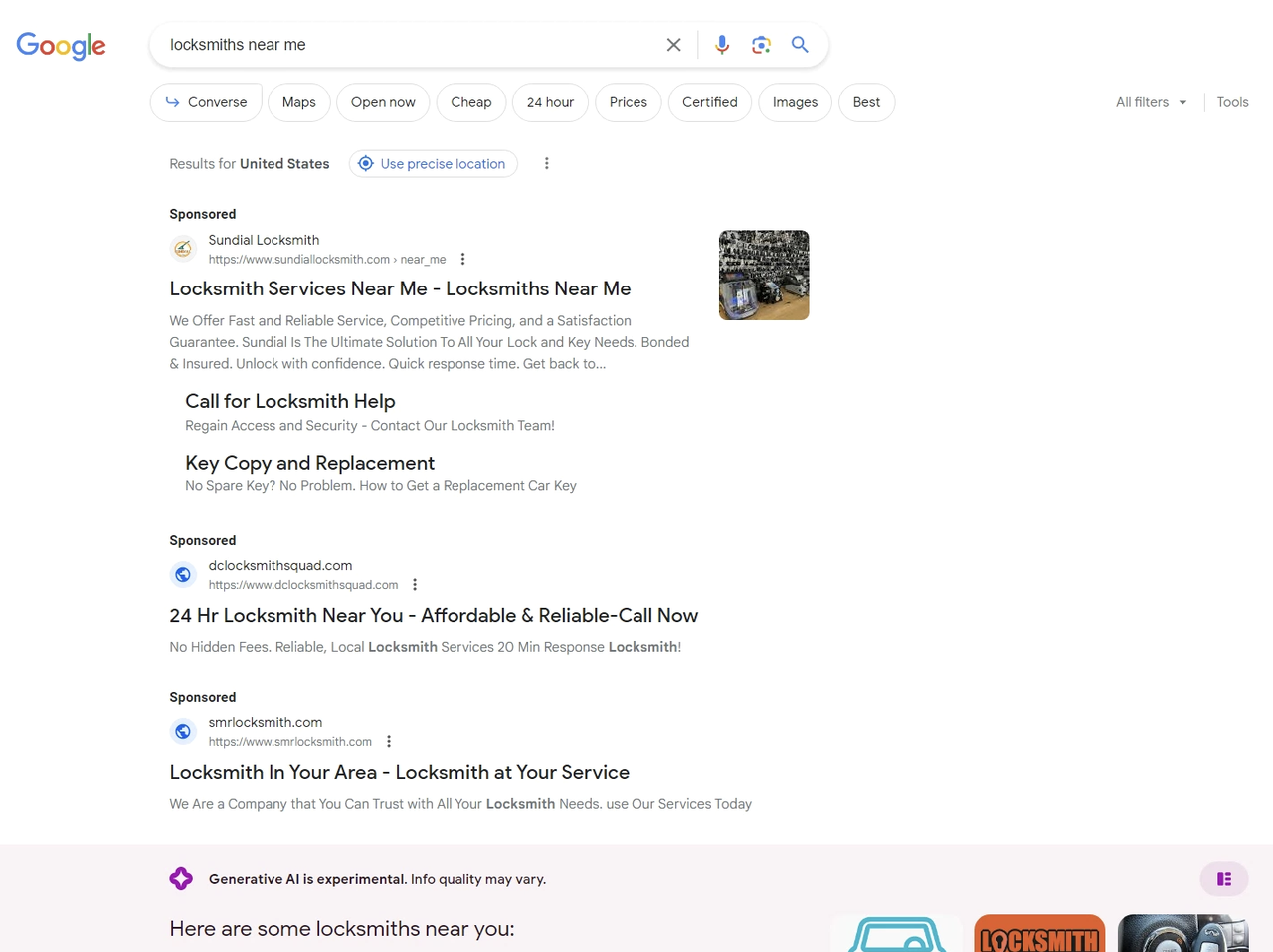
This is new territory for Google, and at the time of publishing access is only available via Google Labs.
We’ve yet to fully test it out but here are some questions we’re already pondering.
Will people actually use it?
There are a lot of Google innovations that have fallen by the wayside over the years (#ripGoogle+). So many, in fact, that there’s a website dedicated to products Google has killed off https://killedbygoogle.com/.
The buzz around AI is huge and we anticipate users will respond well to this. However, voice search was once the ‘next big thing’ and that hasn’t really taken off in the way we thought so there’s a possibility people just aren’t interested in searching in this way.
What about Featured Snippets?
Featured Snippets have long been a target for SEOs that coveted "position 0". With AI answers coming into search results, will there still be a place for Featured Snippets?
How does source attribution work?
This is a big one. Essentially Google is using existing content to create its own version using AI. That in itself raises some moral and ethical considerations, after all it is using your content as the basis to create its AI-generated content.
The AI generated answers being produced look to include multiple “sources” as part of the page feature but it's not clear yet how exactly those sources are determined and what factors dictate the order they are displayed in.
Did images just become even more important?
It certainly looks like they might. Where sources are shown within the AI results they appear with accompanying images. Given Google Ads suggest including images in ads increases click-through rates it’s not hard to imagine that the images affecting the click-through rates here. Just look at the example below to see the difference it makes to the appearance.

Google isn’t really in the social media space but YouTube Shorts is its attempt to compete in the short form video market alongside TikTok and Instagram Reels.
Could we see YouTube and YouTube Shorts in particular as the source of the Perspectives content? Would this be enough to pull creators over from TikTok and Instagram and create a boom in the production of this style of content?
There’s no denying it; this is a big change and there’s no doubt it’s going to have ramifications for us all. As with everything Google does when it changes the playing field, it’s important not to panic, jump to any conclusions or deviate from what you’re doing until we know more.
What is clear is the direction SEO has been going in recent years has been leading to this. The emphasis on producing less content but creating better content with a clear value and differentiator isn’t changing.
There is a greater requirement to demonstrate experience and expertise. If you haven’t done so already, now is the time to identify who your experts are and how you can bring them to the fore in the content you are producing. It would also be wise to look at who are the sector experts outside of your business and explore how you might partner with them to piggyback on their expertise and authority.
Links are, as they always have been, the foundation of SEO. Continue to build your authority through relevant and high-value links and mentions and leveraging the power of digital PR to build brand awareness.
There’s a lot to process and some big changes coming, and in time new opportunities will emerge. It’s certainly not the end of SEO; it might be the end of some parts of SEO as we know it but it’s not dead yet.
Learn more about what Google's Search Generative experience means in general and how it's going to look.
Read part one